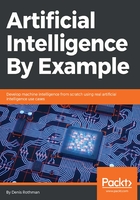
Evaluating a position in a chess game
Evaluating a position in a chess game shows why machines will surpass humans in quite some decision-making fields within the next few years.
The following position is after move 23 in the Kramnik-Bluebaum 2017 game. It cannot be correctly evaluated by humans. It contains too many parameters to analyze and too many possibilities.

It is white's turn to play, and a close analysis shows that both players are lost at this point. In a tournament like this, they must each continue to keep a poker face. They often look at the position with a confident face to hide their dismay. Some even shorten their thinking time to make their opponent think they know where they are going.
These unsolvable positions for humans are painless to solve with chess engines, even cheap, high-quality chess engines on a smartphone. This can be generalized to all human activity that has become increasingly complex, unpredictable and chaotic. Decision-makers will increasingly rely on artificial intelligence to help them make the right choices.
No human can play chess and evaluate the way a chess engine does by simply calculating the positions of the pieces, their squares of liberty, and many other parameters. A chess engine generates an evaluation matrix with millions of calculations. The following table is the result of an evaluation of only one position among many others (real and potential).

The value of the position of white is 34.

The value of black is 33.7.
So white is winning by 34-33.7 = 0.3.
The evaluation system can easily be represented with two McCulloch-Pitts neurons, one for black and one for white. Each neuron would have 30 weights = {w1,w2....w30}, as shown in the previous table. The sum of both neurons requires an activation function that converts the evaluation into 1/100th of a pawn, which is the standard measurement unit in chess. Each weight will be the output of squares and piece calculations. Then the MDP can be applied to Bellman's equation with a random generator of possible positions.
Present-day chess engines contain barely more intelligence than this type of pure calculation approach. They don't need more to beat humans.
No human, not even world champions, can calculate this position with this accuracy. The number of parameters to take into account overwhelms them each time they reach a position like this. They then play more or less randomly with some kind of idea in mind. It resembles a lottery sometimes. Chess expert annotators discover this when they run human-played games with powerful chess engines to check the game. The players themselves now tend to reveal their incapacity when questioned.
Now bear in mind that the position analyzed represents only one possibility. A chess engine will test millions of possibilities. Humans can test only a few.
Measuring a result like this has nothing to do with natural human thinking. Only machines can think like that. Not only do chess engines solve the problem, but also they are impossible to beat.
At one point, there are problems humans face that only machines can solve.